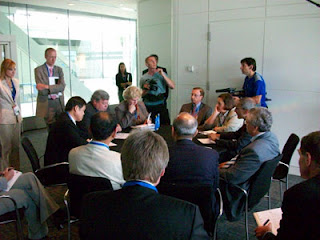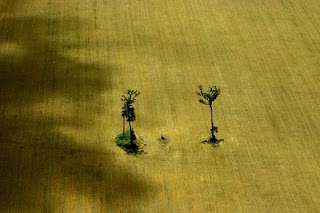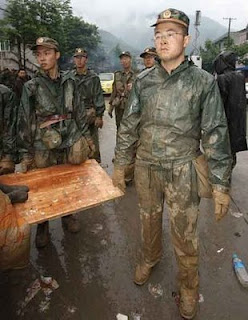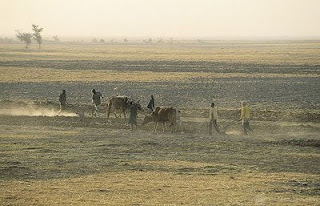-
Climate Change and Security
› Presidential administrations usually end with sepia retrospectives and long, adulatory lists of accomplishments. The present administration is unlikely to end this way, but it will certainly go out with many “what if” epitaphs. Near the top of my “what if” list is, “What if this administration had taken the threat of global climate change seriously and acted as though our future depended on cutting emissions and cooperating on adaptation?”
Presidential administrations usually end with sepia retrospectives and long, adulatory lists of accomplishments. The present administration is unlikely to end this way, but it will certainly go out with many “what if” epitaphs. Near the top of my “what if” list is, “What if this administration had taken the threat of global climate change seriously and acted as though our future depended on cutting emissions and cooperating on adaptation?”
From July 27-30, 2008, my organization, the Center for a New American Security, led a consortium of 10 scientific, private, and public policy organizations in an experiment to answer this particular “what if.” The experiment, a climate change “war game,” tested what a change in U.S. position might mean in 2015, when the effects of climate change will likely be more apparent and the global need to act will be more urgent. The participants were scientists, national security strategists, scholars, and members of the business community from China, Europe, India, and the Americas. The variety was intentional: We hoped to leverage a range of expertise and see how these different communities would interact to solve problems.
Climate change may seem a strange subject for a war game, but one of our primary goals was to highlight the ways in which global climate change is, in fact, a national security issue. In our view, climate change is highly likely to provoke conflict—within states, along borders as populations move, and, down the line, possibly between states. Also, the way the military calculates risk and engages in long-term planning lends itself to planning for the climate change that is already locked in (and gives strategic urgency to cutting emissions and preventing future climate change).
The players were asked to confront a near-term future in 2015, in which greenhouse gas emissions have continued to grow and the pattern of volatile and severe weather events has continued. The context of the game was an emergency ad-hoc meeting of the world’s top greenhouse gas emitters in 2015—China, the European Union, India, and the United States—to consider future projections (unlike most war games, the projections were real; Oak Ridge National Laboratory analyzed regional-level Intergovernmental Panel on Climate Change data from the A1FI series specifically for the game). The “UN Secretary-General” challenged the top emitters to come up with an agreement to deal with increased migration resulting from climate change; resource scarcity; disaster relief; and drastic emissions cuts.
Although the players did reach an agreement, which is an interesting artifact in itself, that was not really the point. The primary objective was to see how the teams interacted and whether we gained any insight into our current situation. While we’re still processing all of our findings, I certainly came away with an interesting answer to that “what if” question. If the United States had been forward-leaning on climate change these past eight years, taking action at home and proposing change internationally, it would have made a difference, but only to a point. As important as American leadership will be on this issue, it is Chinese leadership—or followership—that will be decisive. And it is going to be very, very difficult—perhaps impossible—for China to lead, at least under current circumstances. The tremendous growth of China’s economy has lifted hundreds of millions of people out of poverty, but there are hundreds of millions more still to be lifted. The stark reality is that China will be fueling that economic growth with coal, oil, and natural gas—just as the United States did in the 20th century—unless and until there is a viable alternative.
If the next administration hopes to head off the worst effects of global climate change, it will not only have to find a way to cut greenhouse gas emissions at home, it may well have to make it possible for China to do so, too.
Sharon Burke is a national security expert at the Center for a New American Security, where she focuses on energy, climate change, and the Middle East.
Photo: The U.S., EU, and Chinese simulation teams in negotiations. Courtesy of Sharon Burke. -
Amazon Fund to Target Sustainable Development; Strong First Step, Say Experts
›August 30, 2008 // By Wilson Center Staff Last month, in an effort to prevent further deforestation of the Amazon, Brazil announced the creation of the Amazon Fund, which aims to make preserving the world’s largest tropical rain forest more lucrative than destroying it. Norway was the first country to contribute to the initiative, offering a pledge of $100 million. Officials project that the fund may receive up to $1 billion in its first year and may accrue as much as $21 billion by 2121.
Last month, in an effort to prevent further deforestation of the Amazon, Brazil announced the creation of the Amazon Fund, which aims to make preserving the world’s largest tropical rain forest more lucrative than destroying it. Norway was the first country to contribute to the initiative, offering a pledge of $100 million. Officials project that the fund may receive up to $1 billion in its first year and may accrue as much as $21 billion by 2121.
By creating an endowment open to international investors, Brazil appears to have shed some of its usual suspicions of foreign encroachment on the Amazon and acknowledged that conservation efforts will only be sustainable with considerable outside support. Yet the funds will still be controlled by Brazil’s National Development Bank (BNDES)—which, according to BNDES environment director Eduardo de Mello, means “donors will have no say over the use of [the Amazon Fund’s] resources.” Within BNDES, a steering committee made up of federal and state officials will be in control of the funds. According to the proposal listed online by BNDES, the Amazon Fund will target the following areas: Brazilian sovereignty; infrastructure development; combating deforestation; indigenous rights; sustainable development; and government, business, and civil cooperation.
The Amazon Fund is guided by the Brazilian government’s Plano Amazônia Sustentável (PAS), or Sustainable Amazon Plan, which was issued in May 2008. Carlos Nobre, a senior climate scientist at Brazil’s National Institute for Space Research, was one of the principal architects of this plan, and presented it to an American audience at a January 16, 2008, conference at the Woodrow Wilson Center. PAS offers a holistic vision for protecting the Amazon that goes beyond conservation efforts, calling for the creation of a new economic paradigm centered on sustainably “globalizing the development capacity of the Amazon and producing value-added goods and services.” Nobre told Reuters that while the Amazon Fund is a positive initial step, it nevertheless “just postpones deforestation…the final fix is to create a new economy that can give jobs to several million people.” This “paradigm shift,” he explained, requires the entrepreneurial capacity to “translate biodiversity wealth into economic wealth.”
Response to the Amazon Fund has been generally positive, albeit guarded. According to Paulo Gustavo Prado, environmental policy director of Conservation International’s (CI) Brazil program, the Fund is a helpful move in the fight to combat deforestation in the Amazon, but is still a work “under construction” (e-mail exchange with Alan Wright). For instance, it is possible that the resources will be used to fill “gaps in governance”—in other words, to fund additional enforcement actions against illegal logging in the Amazon—and therefore have little direct impact on Amazonian society as whole. He observed that the prospect for private-sector involvement seems limited by the fact that funders will have no influence over the use of funds, so the initiative is unlikely to draw money for carbon-offset projects. Prado remarked that by reducing the cost of conservation-related activities, it appears that the Amazon Fund will encourage the work of organizations such as CI. He also stressed CI’s commitment to see that the Fund will be made available to researchers and scientists, and that indigenous and local communities and state and municipal governments will be involved in the decision-making process.
It remains to be seen how other issues—such as the ambitious Initiative for the Integration of the Regional Infrastructure of South America (IIRSA), lingering land rights issues, and Brazil’s commodity export boom—will affect the Amazon Fund’s overall efficacy.
By Brazil Institute Program Assistant Alan Wright and Brazil Institute Intern Matthew Layton.Photo: Area deforested for agricultural use in the state of Mato Grosso, Brazil. Courtesy of flickr user leoffreitas.
-
“Adapt we must”: Joshua Busby on the Climate-Security Connection
›August 29, 2008 // By Sonia Schmanski In “The Climate Security Connection: What it Means for the Poor,” Joshua Busby (listen to ECSP podcast with Busby) discusses the security implications of climate change for the developing world. In this paper, written for “Development in the Balance: How Will the World’s Poor Cope With Climate Change?,” the fifth annual Brookings Blum Round Table, held earlier this month, Busby explains that “[d]eveloping countries are most vulnerable, partly as an accident of geography, but also because vulnerability is made worse by poverty, bad governance, and past conflict.”
In “The Climate Security Connection: What it Means for the Poor,” Joshua Busby (listen to ECSP podcast with Busby) discusses the security implications of climate change for the developing world. In this paper, written for “Development in the Balance: How Will the World’s Poor Cope With Climate Change?,” the fifth annual Brookings Blum Round Table, held earlier this month, Busby explains that “[d]eveloping countries are most vulnerable, partly as an accident of geography, but also because vulnerability is made worse by poverty, bad governance, and past conflict.”
Busby compares the aftermath of Cyclone Nargis, which pounded Burma in May 2008, to that of an armed attack, describing both as causing “widespread suffering, destruction of infrastructure, mobilization of the military, and the movement of refugees.” In fact, between 1991 and 2005, natural disasters led to as many deaths as armed conflict, as Busby notes. The subsequent political battles around outside efforts to deliver aid “gave people around the world a visual image of the potential future,” says Busby, and offered a glimpse of “the security risks when affected countries lack the capacity or will to respond.”
The economic consequences of natural disasters can also be crippling. In absolute terms, the developed world suffers larger financial losses, but as a share of GDP, the damage to developing countries is far greater. Additionally, though the death toll of natural disasters continues to fall, the total number of affected people is on the rise, which means that many more people are relying on government services to regain their footing in the wake of natural disasters.
These consequences have long-term security implications for a world in which natural disasters are becoming more frequent and severe. “Post-disaster environments are going to be dangerous moments,” Busby predicts, “when mishandled or inadequate disaster response can give way to the kinds of lingering grievances that can motivate people to take up arms.” To prevent this, he advocates an international focus on adaptation and risk-reduction strategies, and cautions against narrowly focusing on the causal relationship linking climate change to violent conflict. By doing so, policymakers and practitioners overlook what Busby says is the more likely outcome, in which large-scale disasters sap government resources by creating humanitarian emergencies that require military mobilization in response. In “Gathering Storm – the humanitarian impact of climate change,” the UN’s Integrated Regional News Networks (IRIN) explores how climate change has altered the face of global humanitarian crises.
Offering a sharp critique of the reactive strategy of many governments, Busby suggests that a modest investment in prevention would be more efficient and more effective. A joint assessment by the World Bank and the U.S. Geological Survey, for example, found that a $40 billion investment in natural-disaster prevention could have prevented $280 billion in damages worldwide during the 1990s. The reactive approach also threatens to politicize the carefully guarded neutrality of aid workers and organizations; engender international friction where inadequate government response leads to international intervention; and sap government resources through costly responses to humanitarian crises.
Busby envisions a system where “the poor bear less of the brunt of half-hearted and partial reactive measures” in response to climate change. Noting Paul Collier’s finding in The Bottom Billion that past conflict is an accurate predictor of future poverty, Busby argues that reducing the potential for violence in post-disaster situations will improve development prospects for countries worldwide. An enlightened approach, emphasizing prevention over reaction, will not only insulate vulnerable regions from the immediate dangers of natural disasters, but will also protect them from more indirect, long-term threats to their prosperity and security.
Photo: Tens of thousands of Chinese soldiers were mobilized in response to the May 12th earthquake. As climate change makes natural disasters more frequent and more severe, this will likely become an increasingly common sight. Photo courtesy of Flickr user Alex and Jerry.
-
Weekly Reading
›A report from the Center for Strategic and International Studies argues that the global food crisis poses a moral and humanitarian threat; a developmental threat; and a strategic threat. The authors recommend that the United States: modernize emergency assistance; make rural development and agriculture top U.S. foreign policy priorities; alter the U.S. approach to biofuels; ensure U.S. trade policy promotes developing-country agriculture; and strengthen relevant U.S. organizational capacities.
In an article in Scientific American, Jeffrey Sachs argues that the global food shortages Thomas Malthus predicted in 1798 may still come to pass if we do not slow population growth and begin using natural resources more sustainably.
A report by the Government Accountability Office finds that food insecurity in sub-Saharan African persists, despite U.S. and global efforts to halve it by 2015, due to “low agricultural productivity, limited rural development, government policy disincentives, and the impact of poor health on the agricultural workforce. Additional factors, including rising global commodity prices and climate change, will likely further exacerbate food insecurity in the region.”
In an article in the Belgian journal Les Cahiers du Réseau Multidisciplinaire en Etudes Stratégiques, Thomas Renard argues that climate change is likely to increase the risk of environmental terrorism (attacks that use the environment as a tool or target), eco-terrorism (attacks perpetrated on behalf of the environment), nuclear terrorism, and humanitarian terrorism (attacks targeting humanitarian workers).
A Community Guide to Environmental Health, available for free online in PDF, is a field-tested, hands-on guide to community-based environmental health. Topics include waterborne diseases; sustainable agriculture; mining and health; and using the legal system to fight for environmental rights. -
Population Growth, Environmental Degradation Threaten Development in Uganda
›August 28, 2008 // By Sonia Schmanski Climate change, increasing population, and overuse of land, fisheries, and water supplies threaten to undermine development in Uganda, writes Pius Sawa for the Africa Science News Service. Olive Sentumbwe Mugisa, the World Health Organization’s (WHO) population and health advisor in Uganda, warns that Uganda’s economic growth is not keeping pace with its population growth, which is among the fastest in Africa, due to a fertility rate of 6.7 children per woman.
Climate change, increasing population, and overuse of land, fisheries, and water supplies threaten to undermine development in Uganda, writes Pius Sawa for the Africa Science News Service. Olive Sentumbwe Mugisa, the World Health Organization’s (WHO) population and health advisor in Uganda, warns that Uganda’s economic growth is not keeping pace with its population growth, which is among the fastest in Africa, due to a fertility rate of 6.7 children per woman.
Native Ugandan Gladys Kalema-Zikusoka spoke about the interconnectedness of population, health, and environment issues in Uganda in two events at the Wilson Center in May of this year. Kalema-Zikusoka is the founder and director of Conservation Through Public Health (CTPH), which works to conserve the habitat of the endangered mountain gorilla by strengthening community health services and providing communities with information about the benefits of family planning.
Kalema-Zikusoka is also the author of an upcoming issue of Focus, the Environmental Change and Security Program’s series of occasional papers featuring Wilson Center speakers. Her piece describes CTPH’s work in and around Bwindi Impenetrable National Park, where it has found great success in addressing health, conservation, family planning, and livelihood issues in an integrated fashion.
Photo: Woman and children in southern Uganda. Courtesy of flickr user youngrobv. -
UN Environment Programme to Conduct Post-Conflict Assessment in Rwanda
›August 27, 2008 // By Sonia SchmanskiAlthough it has been 14 years since violence devastated Rwanda, the UN Environment Programme (UNEP) is now preparing to conduct a Post-Conflict Assessment (PCA) of the country. As Rwanda Project Coordinator Hassan Partow explained, “UNEP does not initiate environmental assessment in any country, it only comes in when invited,” and Rwanda only recently requested that a PCA be conducted (see full list of PCAs here).
In a May 2004 presentation at the Wilson Center, Pekka Haavisto, former chairman of UNEP’s Post-Conflict Assessment Unit (PCAU)—now called the Disasters and Conflicts Programme and headed by David Jensen—remarked that “the post-conflict situation is a unique opportunity to create something new.” Just as environmental issues can lead to conflicts, they can also hamper efforts to create lasting peace following conflict, making PCAs invaluable tools in rebuilding nations following conflict. Common post-conflict environmental challenges include hazardous waste, radioactive materials, deforestation, chemical fires, overcrowded refugee camps, and contaminated water supplies. PCAs assess these challenges and offer recommendations for addressing them.
The environment can also provide a platform for dialogue and cooperation, said Haavisto, citing the case of the Palestinian Territories, where water has long been a nexus of tension and where PCAU has worked since 2001. Israeli and Palestinian officials both support PCAU’s operations in the region, where it brokered an agreement on future environmental cooperation and is working toward reestablishing the Joint Environmental Expert Committee to coordinate sustainable development in the area. Haavisto also noted that UNEP’s PCA work in Iraq following the Gulf War resulted in the first official meeting between Iraq and Iran in nearly 30 years.
The 2007 Sudan PCA cautions that “Sudan is unlikely to see a lasting peace unless widespread and rapidly accelerating environmental degradation is urgently addressed.” The PCA underscored how environmental stresses—including desertification, land degradation, and decreasing rainfall—have contributed to economic desperation, which has been a key instigator of the violence plaguing the region. “It is clear,” said UNEP Executive Director Achim Steiner, that “central to keeping the peace will be the way in which Sudan’s environment is rehabilitated and managed.” Sudan’s tragedy, he said, highlights “how issues such as uncontrolled depletion of natural resources like soils and forests allied to impacts like climate change can destabilize communities, even entire nations.” Yet promisingly, Sudan’s government recently established an environmental ministry, demonstrating how PCAs can spur governments to devote resources to environmental concerns by showing that they are integrally related to economic, health, and security issues.
Though PCAU has completed 18 PCAs since 1995 and has aided in the reconstruction of many countries, Haavisto acknowledged continuing difficulties in persuading governments to prioritize the environment. It has been an ongoing challenge, he said, to “convince different stakeholders that the environment is an important issue that needs to be dealt with immediately.” Yet as the above examples demonstrate, UNEP has achieved considerable accomplishments despite these difficulties. -
Virtual Water Is Promising, But Rational Approach to Agriculture Also Needed, Says Water Expert
›August 26, 2008 // By Karen Bencala For those of you following the development of the “virtual water” concept, which could help us accurately value goods on the international market, address food security in arid regions, and foster global cooperation, Vaclav Smil of the University of Manitoba provides useful commentary in “Water News: Bad, Good and Virtual,” his article in the current issue of American Scientist (subscription required). Like other water experts, Smil touts the potential of desalination and virtual water to change the way we address today’s water challenges (see my recent post on a Scientific American article by Harvard professor Peter Rogers), but he also argues that if we truly want to reduce our water use, we will have to adopt “rational food production” and “sensible carnivory.”
For those of you following the development of the “virtual water” concept, which could help us accurately value goods on the international market, address food security in arid regions, and foster global cooperation, Vaclav Smil of the University of Manitoba provides useful commentary in “Water News: Bad, Good and Virtual,” his article in the current issue of American Scientist (subscription required). Like other water experts, Smil touts the potential of desalination and virtual water to change the way we address today’s water challenges (see my recent post on a Scientific American article by Harvard professor Peter Rogers), but he also argues that if we truly want to reduce our water use, we will have to adopt “rational food production” and “sensible carnivory.”
Smil defines virtual water as “all freshwater required for [the production of] a crop or an animal foodstuff in the place of its origin” and recognizes it as a valuable accounting tool. Yet he also believes that Americans and other affluent consumers must adopt two additional practices if we truly wish to change the way we use and manage our water resources. The first is rational food production; for instance, the United States currently produces approximately 45 percent more food than is needed by its population. The second is sensible carnivory; Smil calculates that if Americans reduced beef, pork, and poultry consumption by a third, they could save a total of 120-140 cubic kilometers of virtual water over the course of a year (equivalent to the amount of virtual water used to make 15 billion leather shoes).
For those who desire a more technical understanding of the concept, the article also goes into detail as to why some crops require more water, why the virtual water costs of dairy and meat products are so high, and why the amount of water saved by importing virtual water depends on the conditions in both the importing and exporting countries.
Photo: Men plowing fields in Mali. Virtual water would encourage arid countries like Mali to import food and devote their scarce water resources to other uses. Courtesy of Curt Carnemark / World Bank. -
“New Demography” Drives World Bank Population Policy in Africa
›August 26, 2008 // By Sonia Schmanski“African elites have long had the perception that rapid population growth was not an issue because of the vastness of Africa, abundance of resources, relatively low population densities and, more recently, the threat of HIV/AIDS,” but as rapid population growth becomes a more urgent problem across the continent, that view is increasingly falling out of favor, said World Bank lead demographer John May in a recent interview with the African Press Organization. As governments work to improve their population programs, the World Bank is adopting “new demography” principles that examine age structures, dependency ratios, human capital investments, and the demographic dividend to craft cross-sectoral approaches to population policy.
Current demographic trends, the result of reduced infant and child mortality and slowly falling fertility rates, will double the population of Africa by 2036 if left unaddressed, said May. The security implications of this population growth are readily apparent. Rapid population growth has been identified as a factor in increasing resource scarcity and can help lead to conflict. In Sudan, for example, the pressures of overgrazing, desertification, ongoing drought, and escalating competition between pastoralist and agriculturalist communities have contributed to violence. Kenya presents a similar scenario: Rapid and uneven population growth led to land scarcity in the late 1980s, exacerbating latent political and ethnic tensions. The violent conflict that erupted between 1991 and 1993 was fueled in part by natural resource scarcity. More recently, insecure land tenure, shaky property rights, and competition over natural resources have triggered violence across East Africa. Population pressures also play a part, and some argue that demographically-induced land scarcity was at the heart of violence in Kenya earlier this year.
May lamented that far less attention has been paid to population than to humanitarian crises, good governance, and climate change—despite compelling evidence that population growth is likely to negatively impact the chances for peace. Sexual and reproductive health, for example, form 20 percent of the global disease burden, and there is compelling evidence that good reproductive health leads to poverty reduction. He reminds us that demographic issues are inextricably tied to larger development issues, and must be addressed together.
Some countries have successfully reduced fertility rates, May noted. In the 1960s, the Tunisian government introduced a program to reduce fertility rates through increased education for girls, government provision of family planning services, and legal reforms to increase the economic status of rural women and girls. Today, the country boasts a replacement-level fertility rate. Efforts to improve gender equity are highly effective in reducing unsustainable population growth: “It could be argued that the population issue in sub-Saharan Africa is in essence a gender issue,” said May, who argued that “[e]conomic and social development is of course the best contraceptive.”
“The task ahead is huge and difficult, however some concrete results have already been obtained,” said May. He offered a simple suggestion to governments wondering how to craft population policies: “let people, especially women, decide for themselves and…provide them with the means to exert their choices.”
 A Publication of the Stimson Center.
A Publication of the Stimson Center.

 Presidential administrations usually end with sepia retrospectives and long, adulatory lists of accomplishments. The present administration is unlikely to end this way, but it will certainly go out with many “what if” epitaphs. Near the top of my “what if” list is, “What if this administration had taken the threat of global climate change seriously and acted as though our future depended on cutting emissions and cooperating on adaptation?”
Presidential administrations usually end with sepia retrospectives and long, adulatory lists of accomplishments. The present administration is unlikely to end this way, but it will certainly go out with many “what if” epitaphs. Near the top of my “what if” list is, “What if this administration had taken the threat of global climate change seriously and acted as though our future depended on cutting emissions and cooperating on adaptation?” Last month, in an effort to prevent further deforestation of the Amazon, Brazil announced the creation of the
Last month, in an effort to prevent further deforestation of the Amazon, Brazil announced the creation of the  In “
In “
 For those of you following the development of the “virtual water” concept, which could help us accurately value goods on the international market, address food security in arid regions, and foster global cooperation, Vaclav Smil of the University of Manitoba provides useful commentary in “
For those of you following the development of the “virtual water” concept, which could help us accurately value goods on the international market, address food security in arid regions, and foster global cooperation, Vaclav Smil of the University of Manitoba provides useful commentary in “

